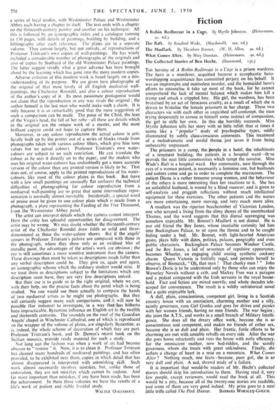Fiction
A Robin Redbreast in a Cage. By Myrtle Johnston. einemann.
95. 6d.)
The Mudlark. By Theodore Bonnet.
(W. H. Allen.
95. 6(1.) What Comes After. By Mary Dunstan. (Heinemann. • 9s. 6d.) The Collected Stories of Ben Hecht. (Hammond. iss.)
THE heroine of A Robin Redbreast in aCage is a prison wardress. The hero is a murderer, acquitted because a sycophantic hero- worshipping acquaintance has committed perjury on his behalf. It was an impromptu and motiveless murder, and the homicidal hero's efforts to rationalise it take up most of the book, for" he cannot comprehend the lack of mental balance which makes him kill a tramp and attack a crippled boy. His girl, the wardress, has been brutalised by an act of ferocious cruelty, as a result of which she is driven to brutalise the -female prisoners in her charge. These two characters vie with each other in anguished self-contempt, the man trying desperately to arouse in himself some instinct of compassion, the girl to stifle her own.. In this she horribly succeeds. Miss Myrtle Johnston tells her story with so little relish that at times it seems like a " popular " study of psychopathic types; oddly illuminated by subtly class-conscious zomments. This treatment of a melodramatic and sordid theme_ just saves it from being unbearably unpleasant.
The prisoners in a camp, the :people in a hotel, the inhabitants of a tenement building, the patients in a hospital ward—ttrse provide the neat little communities which tempt the novelist. Miss Wade's Raft is a hospital ward. Her community, seen through the eyes of a woman patient, is necessarily a feminine one, but husbands and suitors come and go in order to complete the microcosm. The patient Diana is a rather tiresome young woman, and the behaviour of the others is more interesting than her reactions to it. She has an unfaithful husband, is wooed by a blind masseur, and is given to self-analysis and priggish reflections without much intellectual equipment for these exercises. The other patients and the nurses are more entertaining, more moving, and very much more alive.
A mudlark was the riparian beachcomber of Victorian London, one who scraped a living from the slimy shores of the unembanked Thames, and the word suggests that this dismal scavenging was somehow enjoyable. Mr. Bonnet's Mudlark is not dismal. He is our old friend the Boy Jones, whose insatiable curiosity led him into Buckingham Palace, to sit upon the throne and to be caught hiding under a bed. Mr. Bonnet, with light-hearted American gusto, plays billy with dates, politics, palaces, geography and even public characters. Buckingham Palace becomes Windsor Castle, and he Boy Jones, a lad of seventeen of repulsive appearance, becomes Wheeler, an engaging child - oozing synthetic cockney charm. Queen Victoria is fretfully regal, and permits herself to observe, of Bismarck, " Oh, that man ! That cheeky man ! " John Brown's Doric is to be tuiderstood only by those who can enjoy the Waverley Novels without a crib, and Mickey Free was a paragon and a pedant compared with the Irish servants in the royal house- hold. Fact and fiction are mixed merrily, and whole decades tele- scoped for convenience. The result is a wildly unhistorical novel but a quite enjoyable lark.
A dull, plain, conscientious, competent girl, living in a Scottish country house with an omniscient, charming mother and a silly, saintly governess, runs Girl Guides and goes for drives and picnics with her women friends, having no men friends. The war begins ; she joins the A.T.S., and works in a small branch of Military Intelli- gence. She does all the dreary office work, because she is so conscientious and competent, and makes no friends of either sex, because she is so dull and plain. Her frantic, futile efforts to be charming are met with amiable rebuffs on every side After the war she goes home reluctantly and runs the house with surly efficiency, for the omniscient mother, now bed-ridden, and the saintly governess, whom she treats with great unkindness. Finally, she suffers a change of heart in a mist on a mountain. What Comes After? Nothing much, one fears—because, poor girl, she is so very dull and plain. A sad, shrewd study of a failure.
It is important that would-be readers of Mr. Hecht's collected stories should skip his introduction to them. Having read it, very few people, except reviewers, would read the book at all. This would be a pity, because all of the twenty-one stories are readable, and some of them are very good indeed. My prize goes to a neat
little trifle called The Pink Hussar. BARBARA Woanzy-Goucti.


































 Previous page
Previous page